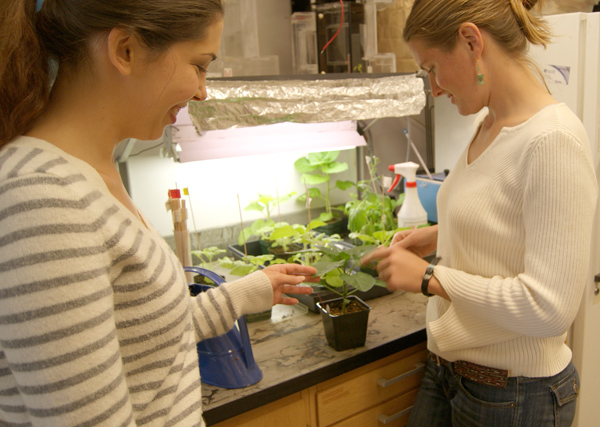 Professor Anastasios Melis, a renowned scientist and PMB faculty member, holds a special place in his heart for achieving undergraduate students and the College of Natural Resources Honors Research Program.
Professor Anastasios Melis, a renowned scientist and PMB faculty member, holds a special place in his heart for achieving undergraduate students and the College of Natural Resources Honors Research Program.
Every year a number of top-ranked undergrads participate in the program, which includes two semesters of research and culminates in a formal dress event, where the students make a presentation about their research, followed by questions from the audience.
It's a great opportunity to get a taste of research in academia and give a formal presentation of scientific endeavors. Entry to the program is rigorous. Applicants must have an overall grade point average within the top 20% of GPAs in the College of Natural Resources, and cannot apply until their junior year.
The program has been in operation since 1995, and Melis serves as organizer and chair of the CNR Honors Research Symposium, the culminating event.
Aspiring Undergrad in Staskawicz Lab
 Annalise Petriello, a microbiology major in her fourth year, is studying a bacterial pathogen in the lab of Professor Brian Staskawicz at PMB. Petriello is working on a project funded by the National Science Foundationg and the Bill and Melinda Gates Foundation to study cassava, a root vegetable and drought-tolerant staple crop in West Africa, South America and parts of Asia.
Annalise Petriello, a microbiology major in her fourth year, is studying a bacterial pathogen in the lab of Professor Brian Staskawicz at PMB. Petriello is working on a project funded by the National Science Foundationg and the Bill and Melinda Gates Foundation to study cassava, a root vegetable and drought-tolerant staple crop in West Africa, South America and parts of Asia.
The goal: To reduce disease and make it easier to grow this crop, which millions of people rely upon as a staple food source. The Staskawicz lab is looking for ways to improve the crop’s resistance.
"We are studying Xam (Xanthomonas axonopodis pv. manihotis), and the goal of the project is to engineer durable Xam resistance in cassava," Petriello said. "This will be done by manipulating the bacterial mechanisms of virulence, namely the Transcription Activator-Like (TAL) Effectors." Effectors are bacterial proteins that are inserted into the plant cell during infection.
As an achieving senior, Petriello is a participant in the CNR Honors Research Program. Her sponsor and the postdoctoral scholar guiding her project, Dr. Rebecca Bart, worked closely with Petriello last semester to develop a strategy for knocking out individual effectors. Now Petriello is using this strategy to knock out the most highly conserved effector proteins from different strains of Xam. "Hopefully this will give us better insight into the importance of the different effector proteins in pathogen virulence," she said.
"Being part of the Honors Program in CNR has been a wonderful experience," Petriello said. "I have a great deal of independence for an undergraduate, and I'm really getting a chance to see a project through on my own, with many available resources. Yet I still feel comfortable asking for assistance or advice from any member of the lab, who are all more than willing to help and teach."
The popularity of the program means that there are now two symposia each year, held at the end of each semester in December and May, immediately after the end of instruction.
In the past four academic years, 157 CNR Honors Research Students have successfully completed the requirements of the CNR Honors Research Program.
For more information about how to apply please visit cnr.berkeley.edu. The next deadline for applying to the program is January 27, 2012.
